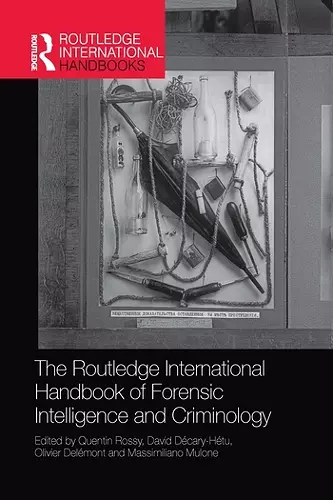The Routledge International Handbook of Forensic Intelligence and Criminology
Massimiliano Mulone editor Quentin Rossy editor David Décary-Hétu editor Olivier Delémont editor
Format:Paperback
Publisher:Taylor & Francis Ltd
Published:30th Jun '20
Currently unavailable, and unfortunately no date known when it will be back
This paperback is available in another edition too:
- Hardback£220.00(9781138688216)

Despite a shared focus on crime and its ‘extended family’, forensic scientists and criminologists tend to work in isolation rather than sharing the data, methods and knowledge that will broaden the understanding of the criminal phenomenon and its related subjects.
Bringing together perspectives from international experts, this book explores the intersection between criminology and forensic science and considers how knowledge from both fields can contribute to a better understanding of crime and offer new directions in theory and methodology.
This handbook is divided into three parts:
- Part I explores the epistemological and historical components of criminology and forensic science, focusing on their scientific and social origins.
- Part II considers how collaboration between these disciplines can bring about a better understanding of the organizations and institutions that react to crime, including the court, intelligence, prevention, crime scene investigation and policing.
- Part III discusses the phenomena and actors that produce crime, including a reflection on the methodological issues, challenges and rewards regarding the sharing of these two disciplines.
The objective of this handbook is to stimulate a ‘new’ interdisciplinary take on the study of crime, to show how both forensic and criminological theories and knowledge can be combined to analyse crime problems and to open new methodological perspectives. It will be essential reading for students and researchers engaged with forensic science, criminology, criminal behaviour, criminal investigation, crime analysis and criminal justice.
"This book is a must for any serious student of forensic science and is particularly recommended for decision makers whether in policy, practice or education. It places forensic science clearly in the arena of solving and preventing crime rather than confining it to providing findings for court. In this manner it suggests that cooperation with criminology will result in getting better value from traces. It is rich in thought provoking frameworks and historical perspectives, often forgotten in forensic science. It is also a rich source of references."
- Dr Sheila Willis, Director General of Forensic Science Ireland
ISBN: 9780367581008
Dimensions: unknown
Weight: 453g
298 pages